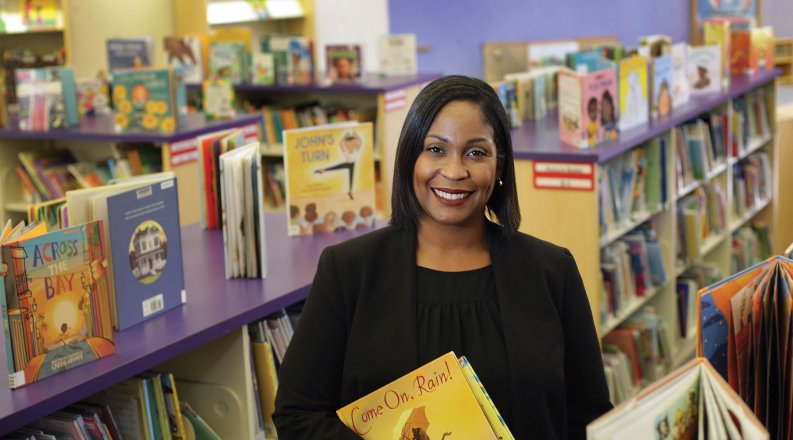As president of the Public Library Association, Sonia Alcántara-Antoine (M.P.A. ’21) stands among the nation’s leading advocates of libraries. “Public libraries have evolved beyond books,” offering social services and laptops, she said. Librarians have evolved, too, from “gatekeepers to knowledge” to “facilitators to transformation.”
During a Zoom interview, Alcántara-Antoine, the CEO of the Baltimore County Public Library, also spoke about book bans, the function of libraries in maintaining a “healthy democracy” and her role as president.
Did you go to the library a lot as a little girl?
My parents emigrated from the Dominican Republic. They were avid readers, but they didn’t have public libraries, so I was never taken to one growing up. In elementary school, I started going to the school library and checking out books, and I loved the experience. I didn’t learn about public libraries until I was a teenager. It was a game-changer for me. There were so many books and so many resources.
When did you decide to become a librarian?
My first job in high school was as a shelver. I always had libraries in the back of my mind, but I never fully considered it a career option until the last month of my senior year of college. I began to look at libraries again. The field was so much more expansive than I had realized. Once I did that research, it was full speed ahead, and no looking back.
What did you learn from your first few jobs?
As special assistant to the CEO at Enoch Pratt Free Library in Baltimore, Maryland, I got a bird’s-eye view of what it’s like to be the CEO of a major urban library. In Virginia Beach, I was the public services manager, focusing on how to provide relevant and impactful services to the community. I was director of the Newport News Public Library, where I really got to stretch my legs and learned how to lead an organization. Those three experiences were key in helping me get where I am today.
What’s the biggest misconception people have about libraries?
It’s that we’re all about books. Yes, we’ve got lots of books, but public libraries have evolved beyond books. We are serving the needs of the community more directly than ever before. In Baltimore County, we have social workers at the library. We connect people with the resources that they need.
Another thing we do is distribute meals to kids during the summer and after school. Kids can’t read a book if they’re hungry.
You’ve called the public library a “very democratic institution.” Describe what you meant.
We serve everyone, and not every institution can say that. You can be experiencing homelessness or you could be a millionaire, and you will have access to the same resources and will be treated the same. And we are integral to a healthy democracy. Public libraries help inform engaged citizens about the issues that matter most.
How has the role of librarians changed?
When I started in the early ’90s, librarians were very much the gatekeepers to knowledge. If you had a question, you would go to the desk, and the librarian would go through the reference books to answer your question. Now librarians are more like facilitators to transformation. Our job is to help you get where you need to be. It’s meeting people where they are, sometimes in the branch, sometimes out in the communities.
Librarians also have a unique role providing access not only to internet, but also to emerging tech, and addressing digital inequity within our communities. During the pandemic, we began circulating Wi-Fi hot spots and Chromebooks. Long-term, we want to provide people with permanent access to affordable and reliable internet.
What does the Public Library Association do? What is your role as president?
The Public Library Association represents over 9,000 public libraries nationwide. My role is to provide direct and indirect support to public library workers and advocate for them on the national stage so that they have the resources they need to serve their communities.
How do you respond to the increasing campaigns to ban books?
The frequency of book bans and challenges is alarming. It’s crucial for us to build collections and programs that reflect the needs of the communities we serve and provide access to diverse perspectives. Parents 100% have the right to determine what their children can and cannot read, but they don’t have the right to tell other parents what their children can read. It’s not a library’s job to censor.
BOOK REVIEWS
Alcántara-Antoine recommends these two books:
“The Warmth of Other Suns,” by Isabel Wilkerson. “This book is powerfully written and provides a sobering look at what life was like for African Americans before, during and after the Great Migration.”
“All Boys Aren’t Blue,” by George M. Johnson. “It is an eloquent and hopeful examination of the intersectionality between being Black, gay and male in the U.S.”



